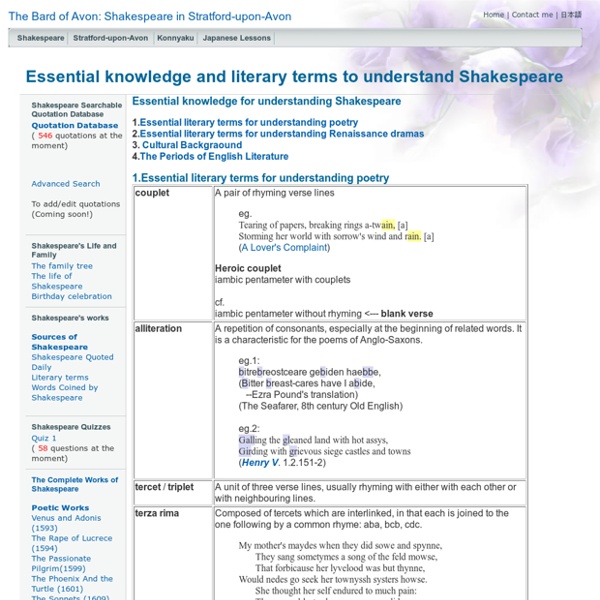



Open Source Shakespeare: search Shakespeare's works, read the texts ENGL 339 Home Page English 339: Introduction to ShakespeareFall, 2013 Site Navigation PREREQUISITES: GE area A (esp. expository writing, e.g. A WRITING-INTENSIVE, G.E. GWR: As a C4 literature class, ENGL 339 may be taken by students wishing to fulfill the Graduate Writing Requirement (GWR). ENGL 339 is designed to introduce both English or Theatre majors and G.E. students to representative plays of all genres by William Shakespeare, perhaps the finest poet ever to write in English. REQUIRED TEXTS: The SIGNET CLASSICS editions of A Midsummer Night's Dream; Henry V; Macbeth; Hamlet; and The Tempest. NOTE: As You Like It has been dropped from the class this quarter due to the necessity of scheduling a video screening of a film available only on VHS during class time. Other required readings will be accessed electronically: Online Readings are found in .HTML files accessible through links on this website and E-reserve readings in the form of .PDF files on "electronic reserve" in PolyLearn.
Deception and dramatic irony in Much Ado About Nothing Although the characters might be fooled by the many deceptions in the play, the audience seems to know better, but Andrea Varney suggests that our role as observers is more complex and uncertain. In Much Ado About Nothing, Shakespeare sets up a fairy-tale contrast between two half-brothers – Don Pedro and the illegitimate Don John. As in many plays of this era, the ‘bastard’ is cast as the villain while Don Pedro, the Prince of Aragon, seems to be the reliable face of authority in Messina. Within this symmetrical structure, we might expect the good Prince to be open and honest, while Don John and his cronies will be duplicitous. However, it soon becomes clear that deception and self-deception, visual and verbal confusion, are rife everywhere in Messina – from Don Pedro’s benevolent schemes to bring two pairs of lovers together, to Don John’s vindictive plots to pull them apart. A ‘plain-dealing villain’ and a disguised prince The masked ball: to ‘know me, and not know me’ ‘Trust no agent’
Romeo & Juliet Using this Guide List of other study guides The notes were prepared for use with an edition of Romeo and Juliet bound together with the book for West Side Story and in conjunction with a showing of Franco Zeffirelli's film version of the play, but they will be useful with any edition or production. The introduction focuses primarily on comparisons with West Side Story, so it has relatively little to say about the play as such. As noted, this is often regarded as a lesser Shakespeare tragedy by scholars, but what should also be kept in mind is that audiences have made it one of the most beloved plays of all time from the Elizabethan Age to the present. Romeo and Juliet are often considered the archetypal lovers, and at one time "a romeo"--meaning a lover--was a common noun. Although Shakespeare's dialogue often reads beautifully enough on the page, please keep in mind that he never intended his words to be read. Shakespeare wrote almost no original plots. Prologue Act I: Scene 1
Shakespeare Insult Generator: Thou Shall Say It Like Shakespeare Advertisement How would you like to be able to whip out a Shakespeare insult on the fly whenever necessary? This is such an oldie but a goodie. I remember seeing this make the rounds on the Internet a few years ago, and I didn’t write about it back then. Now it’s picking up a little steam again, so I had to share it with you. Even though reading Shakespeare might be more painful than poking your eyeballs out with an ice pick, the words in those books are kinda funny. It’s easy to use. There are a few people who have taken this rank elf-skinned clack-dish and turned it into an online version. Shakespeare Navigators Absolute Shakespeare - plays, quotes, summaries, essays... 5 facts about marriage, love, and sex in Shakespeare's England Considering the many love affairs, sexual liaisons, and marriages that occur in Shakespeare’s plays, how many of them accurately represent their real-life counterparts? Genuine romantic entanglements certainly don’t work out as cleanly as the ending of Twelfth Night, where Sebastian and Olivia, Duke Orsino and Viola, and Toby and Maria all wind up as married couples. However, Shakespeare’s imaginary theatrical arrangements frequently collided with significant thoughts and beliefs of 16th-century England, such as a woman’s duty as a wife and the social standing of “bastard” children. In the late 16th century, the legal age for marriage in Stratford was only 14 years for men and 12 years for women. Usually, men would be married between the ages of 20 and 30 years old. Featured Image: Elizabeth I and the Three Goddesses by “H.E.” (1569).
Enjoying "Macbeth" by William Shakespeare Enjoying "Macbeth", by William Shakespeare by Ed Friedlander, M.D.erf@kcumb.edu This Is NOT "Family Entertainment." Young people who know of Shakespeare from "Shakespeare Gardens" and "Beautiful Tales for Children" may be surprised by what happens in Macbeth. When we first hear of Macbeth, he has just cut an enemy open ("unseamed") from belly button ("nave") to throat ("chops"). The Real Macbeth and His Times Shakespeare got his story from Raphael Holinshed's Chronicles. I've read that Holinshed's section on Macbeth was largely derived from the work of one Hector Boece, Scotorum Historiae ("Chronicles of Scotland", 1526-7, translated from Latin into English by a John Bellenden in 1535). It is evidently not online. Here's what we think really happened with Macbeth and the other characters. In a barbaric era, population pressures made war and even the slaughter of one community by another a fact of life. The historical Mrs. Macbeth allied with Thorfinn of Orkney, a Norseman. Mr. Evil?
BBC History - William Shakespeare